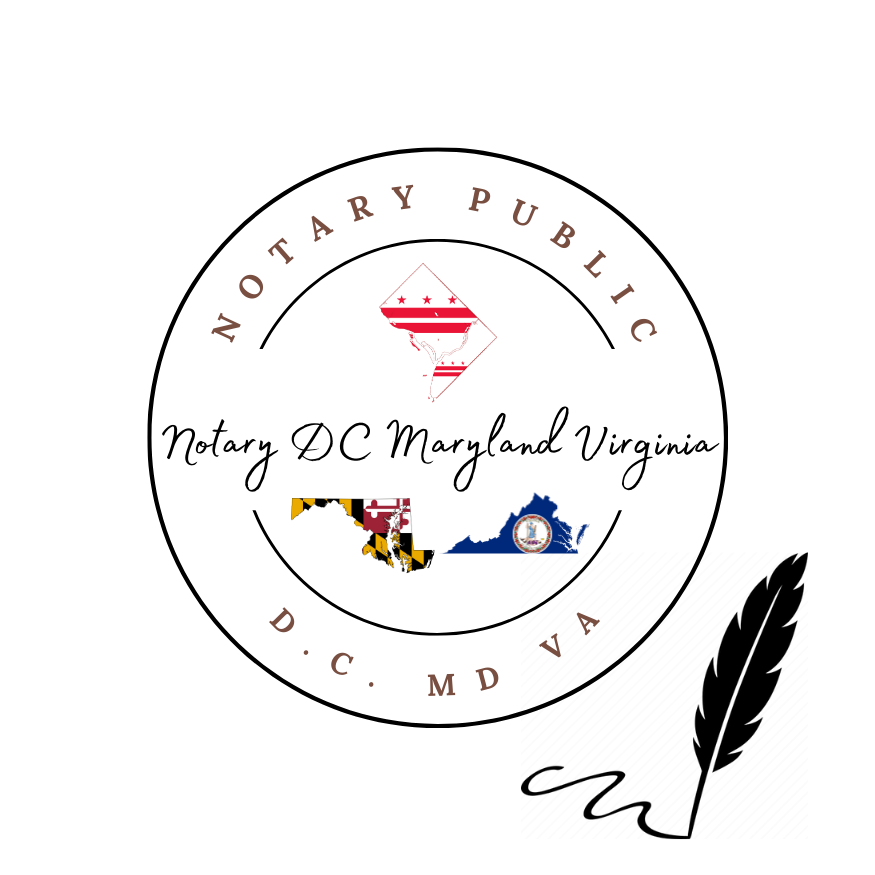Notarizing Estate Planning Documents in DC, Maryland, Virginia
Planning for the future involves making critical decisions to ensure your assets are distributed according to your wishes. Estate planning requires drafting legal documents, such as wills, trusts, and powers of attorney, to determine how your estate will be managed after your passing. One often overlooked but vital role in the estate planning process is that of the notary.
A notary acts as an impartial witness, verifying the authenticity of documents and ensuring that all necessary steps are followed. In this article, we’ll explore the importance of notarizing estate planning documents and how notaries help safeguard the integrity of your estate plan.
What Role Does a Notary Play in Estate Planning?
A notary public is a state-authorized individual trained to act as an official witness during the signing of legal documents. In the context of estate planning, their role is especially critical. The primary responsibility of a notary is to confirm that documents, such as wills, powers of attorney, and healthcare directives, are executed properly.
They do this by verifying the identities of the signatories, ensuring that the signing is voluntary and free from coercion, and witnessing the signatures. By involving a notary, you add a layer of legal protection to your estate planning documents, making them more likely to be upheld in court.
Why is Notarization Important in Estate Planning?
Notarization is a crucial step in ensuring that estate planning documents are legally binding and immune to future challenges. Here’s why you need a notary for your estate planning:
1. Preventing Fraud and Coercion
Estate planning documents like wills are often vulnerable to fraud and manipulation. Without a notary, someone could attempt to alter the terms of the documents, potentially taking advantage of the testator. Having a notary witness the signing ensures the process is transparent and the document is signed voluntarily. This safeguard helps protect the authenticity and integrity of your estate plan.
2. Ensuring Legal Compliance
Each state has its own requirements for executing estate planning documents. For instance, some states mandate that wills be notarized to be legally valid. A notary ensures that your documents adhere to local legal standards, protecting your wishes from being contested later. Without proper notarization or witnessing, your will could be subject to delays or disputes, causing unnecessary stress for your loved ones.
3. Authenticity Verification
When you sign estate planning documents like wills, you may need to prove their authenticity in court or to other parties. Notarization provides an official record that verifies the document was signed correctly and that the signatures are genuine. This verification streamlines the probate process and helps prevent legal disputes, making it easier for your executor or trustee to manage your estate.
4. Simplifying the Estate Settlement Process
Estate planning often involves complex assets, out-of-state property, or other issues that require clear documentation. Notarizing your will and other documents can simplify matters, especially when settling your estate across multiple jurisdictions. Notarized documents are recognized universally, which can help your heirs avoid delays and additional legal costs.
Notary’s Role in Will Execution
The execution of a will is one of the most important steps in estate planning. While the legal requirements for notarization may vary by state, a notary often plays a vital role in validating the will. Here’s how a notary can assist:
1. Witnessing the Will’s Execution
In many states, a will must be signed by the testator in the presence of at least two witnesses, who also sign the document. A notary can serve as one of these witnesses or verify the signatures of both the testator and witnesses. Notarizing the will provides extra assurance that the document was executed properly, helping to avoid future challenges to its validity.
2. Creating a Self-Proving Will
Some states allow the creation of a “self-proving” will, which includes an affidavit signed by the testator and witnesses before a notary. This affidavit acts as proof that the will was executed correctly without needing to call witnesses to verify the signatures in probate court. Notarization streamlines the probate process and reduces the chance of complications, especially if witnesses are unavailable.
Other Estate Planning Documents That Benefit from Notarization
While wills are the most common estate planning documents to be notarized, several others may require notarization to be legally binding:
1. Powers of Attorney
A power of attorney designates someone to act on your behalf for financial, medical, or legal matters. Notarizing a power of attorney ensures that it is executed properly and helps prevent any challenges to its validity.
2. Healthcare Directives
A healthcare directive outlines your wishes regarding medical treatment if you become incapacitated. Some states require healthcare directives to be notarized to be legally valid, ensuring that your wishes are respected.
3. Living Trusts
A living trust helps you manage your assets during your lifetime and pass them on to your beneficiaries after your death. Notarizing the trust documents ensures they are legally binding and respected during the asset transfer process.

